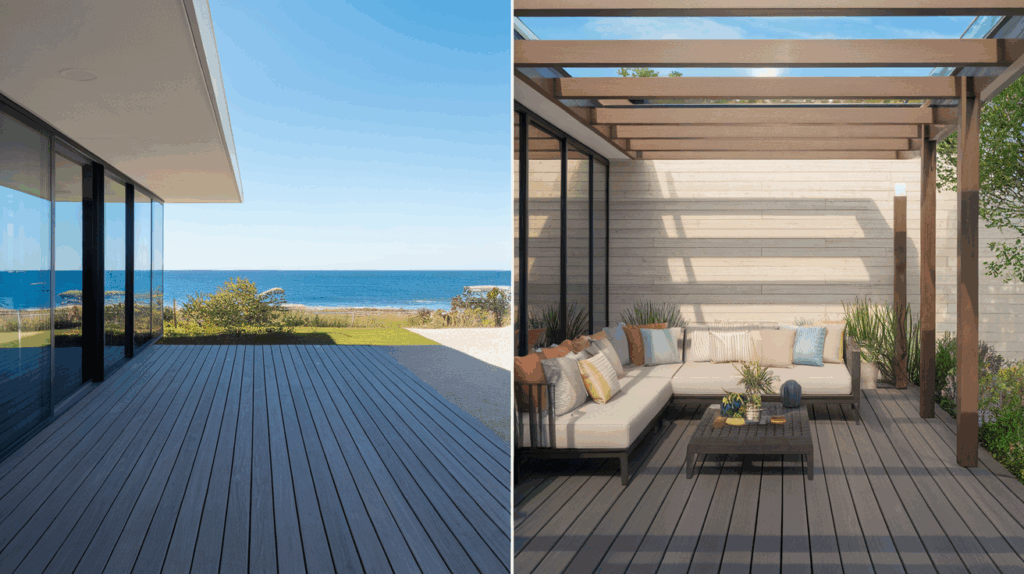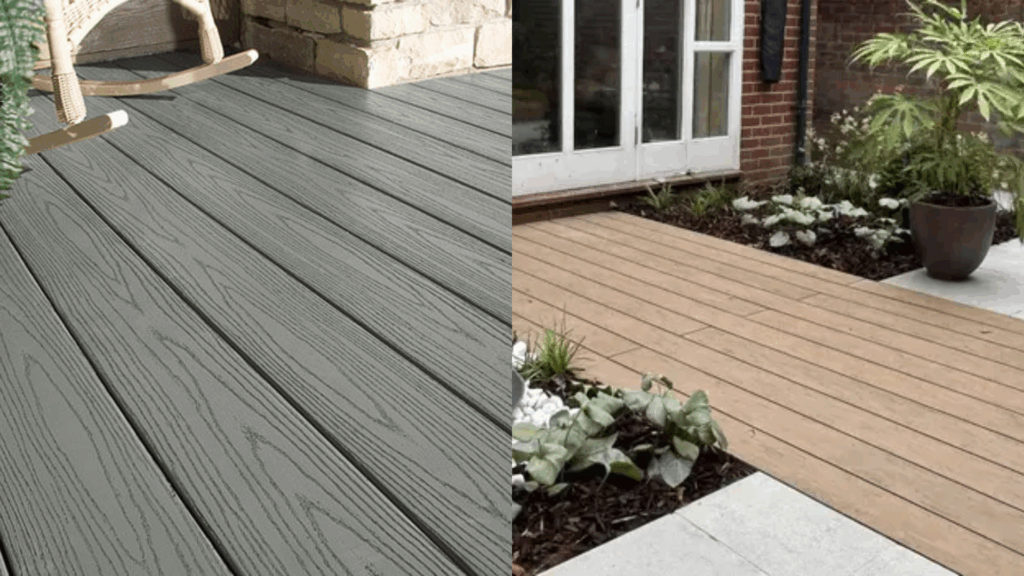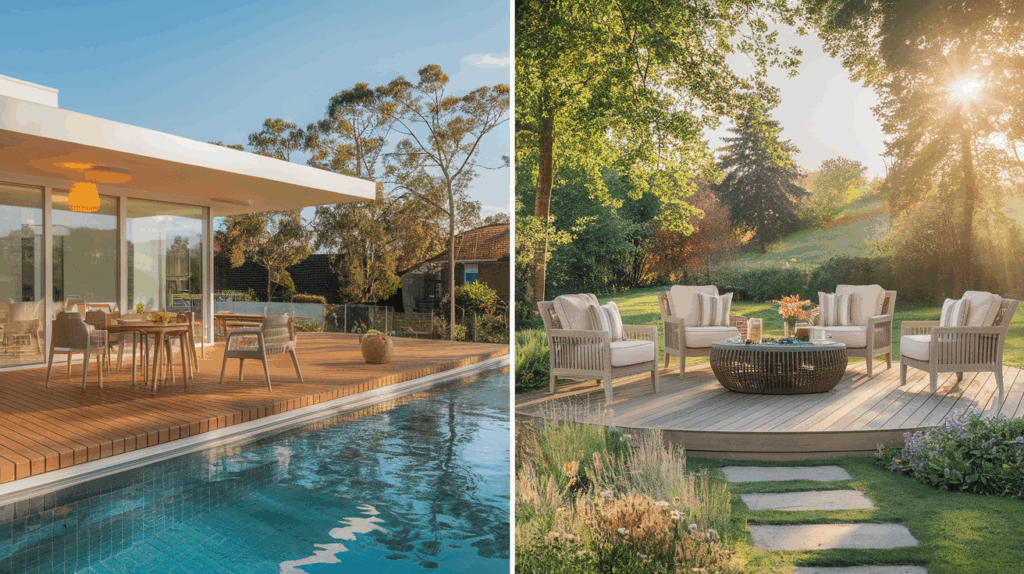Choosing the right decking for your backyard can feel a little confusing, I’ve definitely been there. With so many options out there, how do you know what’s really best for your home?
Two popular choices these days are PVC decking and composite decking.
At first glance, they might seem pretty similar, but after doing my own research and working with both, I’ve learned they have some important differences worth knowing about.
In this blog, I’ll explain both options simply and straightforwardly.
We’ll look at what they’re made of, how long they last, what they cost, and how easy they are to care for.
If you’re building a brand-new deck or just giving your old one an upgrade, I hope this guide makes it easier to decide which type is right for you.
Understanding PVC and Composite Decking
Before you choose between PVC and composite decking, it helps to know what each one really is.
While both are made to look like wood, they’re actually very different in terms of materials and performance.
PVC decking is made from 100% plastic. It doesn’t contain wood, which makes it super tough against moisture, bugs, and mold. It’s also lightweight and easy to clean. If you live in a place with lots of rain or near the ocean, PVC might be a great choice.
Composite decking, on the other hand, is a mix of wood fibers and plastic. It looks more like real wood and often feels warmer under your feet. It’s strong, long-lasting, and doesn’t need a lot of care. Many people like it for its natural look.
Both PVC and composite decking have great benefits; it just depends on what you need. Take your time, compare the options, and choose the one that best fits your home.
PVC vs Composite Decking: Which is Better?

When it’s time to pick a decking material, you might wonder which one is better: PVC or composite. The truth is, both are good choices; it just depends on what you’re looking for.
| Feature | PVC Decking | Composite Decking |
|---|---|---|
| Material | 100% plastic | A mix of wood fibers and plastic |
| Look | Sleek, modern look | More like natural wood |
| Durability | Highly resistant to moisture, rot, and insects | Very durable, but may fade over time |
| Maintenance | Very low, just wash it off | Low—clean it occasionally |
| Cost | Usually more expensive upfront | Slightly cheaper upfront |
| Weight | Lighter and easier to handle | Heavier due to wood content |
| Slip Resistance | Can be slick when wet | Often has a better grip |
| Eco-Friendly | Less eco-friendly | Made with recycled materials |
PVC is great if you want something that’s super easy to care for and can handle tough weather.
Composite is perfect if you love the look of wood but want something that lasts longer than the real thing.
Pros and Cons of PVC and Composite Decking
It’s always helpful to weigh the pros and cons before making a big choice like decking. Both PVC and composite decking offer solid benefits, but they also come with a few trade-offs.
PVC Decking
Pros:
- Very low maintenance. No need to stain, seal, or paint.
- Excellent resistance to water, rot, and insects.
- Lightweight and easy to handle during installation.
- Long-lasting and doesn’t splinter.
Cons:
- Often more expensive than composite decking.
- Can look less natural than wood or composite.
- May get hotter under the sun.
- Can become slippery when wet.
Composite Decking
Pros:
- Looks more like real wood with rich textures and colors.
- Made from recycled materials—more eco-friendly.
- Durable and resists fading, cracking, and warping.
- Requires less maintenance than real wood.
Cons:
- Heavier and sometimes harder to install.
- May require occasional cleaning to prevent mold or mildew.
- Can be slightly more prone to staining than PVC.
- Usually doesn’t last quite as long as PVC.
Both PVC and composite decking are great choices, but one may suit your needs better than the other.
If you want something super low-maintenance and long-lasting, PVC might be the way to go.
If you care more about natural looks and eco-friendly materials, composite could be your best bet.
Style and Design: PVC vs Composite Decking

When choosing decking, looks matter just as much as strength and durability.
Both PVC and composite decking offer good design options, but they have some key differences when it comes to style, color, and finish.
Natural Look and Feel
Composite decking
Known for its wood-like appearance. It often has realistic grain patterns, warm tones, and rich textures that closely mimic real wood.
If you love the charm of natural timber but want something easier to care for, composite is a smart pick.
It blends well with: Traditional homes, rustic designs, and farmhouse styles.
PVC decking
This is more modern. It has a smoother, more uniform look that’s often seen in coastal homes, minimalist outdoor spaces, and modern builds.
The finish gives off a clean, polished vibe that works well with simple lines and open layouts.
While newer PVC options are improving in appearance, they still tend to have a cleaner, more polished finish than composite.
Color Range and Fading Over Time
Composite Decking
- Offers blended colors and shading for a natural wood look
- Popular tones include cedar, mahogany, and walnut
- May fade slightly over time with sun exposure
PVC Decking
- Available in solid colors like white, tan, gray, and brown
- Holds color better over time, even in strong sunlight
- Less prone to fading or staining because it’s 100% plastic
Texture and Surface Feel
Composite Decking
- Has a more textured, wood-like surface
- Often includes embossed woodgrain for added grip
- Feels comfortable underfoot and helps reduce slipping when wet
PVC Decking
- Smoother and more vinyl-like in feel
- It may be more slippery when wet
- Some newer PVC styles include added texture for a better grip
When it comes to style and design, your choice between PVC and composite decking really depends on the look you want for your outdoor space.
Composite offers a more natural, wood-like appearance with textured finishes and blended colors. PVC provides a clean, smooth surface with vibrant, fade-resistant colors.
Choosing Between PVC and Composite Decking
When it comes down to picking the right material for your deck, it helps to look at a few key points.
- Think About Your Climate: If you live in a wet or humid area, PVC might be better because it handles moisture really well. Composite is also strong but may need a little more care in damp spots.
- Consider Your Budget: PVC decking usually costs more upfront, but it may save you money on upkeep over time. Composite decking is often cheaper to install but could need a bit more cleaning and care later on.
- Look at Style and Feel: Composite decking looks more like natural wood and comes in a variety of colors and textures. PVC has a clean, modern look but may not feel as warm or natural under your feet.
- Think About Maintenance: Both materials are easier to care for than wood. But if you want to spend the least amount of time on cleaning and upkeep, PVC is your best bet.
- Check the Warranty: Many PVC and composite brands offer warranties, but they can vary. Always check the details to see what’s covered and for how long.
By looking at your needs and lifestyle, you can pick the decking material that fits you best.
Whether it’s PVC or composite, you’ll be getting a long-lasting, low-maintenance deck that makes your outdoor space shine.
Conclusion
Choosing between PVC and composite decking comes down to your needs, style, and budget.
Both materials offer great benefits like low maintenance and long-lasting performance, but they each shine in different ways.
PVC decking is perfect if you want something lightweight, easy to clean, and resistant to water and bugs.
Composite decking is a great choice if you prefer the look of real wood and want an eco-friendly option with a warm, natural feel.
Before you decide, think about your climate, how much care you want to give your deck, and what kind of look fits your home best.
No matter which one you choose, you’ll end up with a beautiful outdoor space that’s built to last.
With the right choice, your deck can become your favorite place to relax, gather with family, and enjoy the outdoors year after year.

